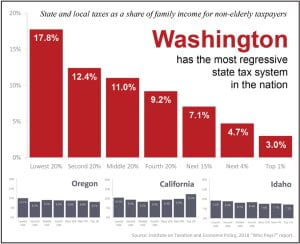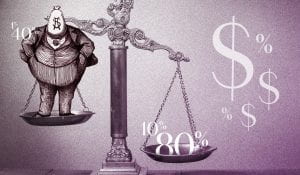Published Jan 16, 2023 in Puget Sound Business Journal
 On January 26, the Washington State Supreme Court will hear arguments about whether to uphold the state’s new 7% tax on stock profits larger than $250,000. Foremost, the Court should let the tax stand because it is constitutional. But the tax will also allow Washington’s small towns, especially those that are struggling, to see outsized benefits as it will help fund the new child care services that so many of our state’s rural communities desperately need.
On January 26, the Washington State Supreme Court will hear arguments about whether to uphold the state’s new 7% tax on stock profits larger than $250,000. Foremost, the Court should let the tax stand because it is constitutional. But the tax will also allow Washington’s small towns, especially those that are struggling, to see outsized benefits as it will help fund the new child care services that so many of our state’s rural communities desperately need.
As an economist, I’ve joined numerous rural leaders, including Pullman small business owner Nick Pitsilionis, in an amicus brief urging the State Supreme Court to help rural economies by upholding the tax.
Nick Pitsilionis owns a restaurant where his employees sometimes miss their shifts, or bring their children to work, because they cannot find affordable child care. He does what he can to accommodate them, sometimes even allowing their children to sit in the restaurant’s office while their parents work. He says the lack of adequate child care in Pullman puts a strain on the rest of his crew, who must pick up the slack when an employee misses work because they lack good child care options. Continue reading


 Washington state’s upside-down tax system, the most regressive in the nation, is back in the news. Last year the legislature took an important step toward balancing Washington’s tax code by passing a capital gains tax on the extraordinary profits extremely wealthy people make by trading stocks, bonds, and other lucrative assets. Forty-one states, including the other West Coast states, have a capital gains tax. And while capital gains taxes in general only impact high-income people who buy and sell assets, the tax in Washington is especially narrow and will be paid by only the wealthiest individuals in our state.
Washington state’s upside-down tax system, the most regressive in the nation, is back in the news. Last year the legislature took an important step toward balancing Washington’s tax code by passing a capital gains tax on the extraordinary profits extremely wealthy people make by trading stocks, bonds, and other lucrative assets. Forty-one states, including the other West Coast states, have a capital gains tax. And while capital gains taxes in general only impact high-income people who buy and sell assets, the tax in Washington is especially narrow and will be paid by only the wealthiest individuals in our state. We all know the massive toll that COVID-19 pandemic and its economic fallout have taken on us all. But at long last, we are starting to see hopeful signs of better days ahead – increased vaccinations, restrictions lifted, and plans for kids to return to school. So now – right now – is when Washington state needs to invest in proven strategies that will ensure our state’s long-term health and economic recovery.
We all know the massive toll that COVID-19 pandemic and its economic fallout have taken on us all. But at long last, we are starting to see hopeful signs of better days ahead – increased vaccinations, restrictions lifted, and plans for kids to return to school. So now – right now – is when Washington state needs to invest in proven strategies that will ensure our state’s long-term health and economic recovery. The coronavirus is not just a health disaster, but an economic one as well. There are, of course, the steep declines in income and consumption we are experiencing. But in addition, the economic tumble has translated into reduced state revenue and a gaping budget deficit.
The coronavirus is not just a health disaster, but an economic one as well. There are, of course, the steep declines in income and consumption we are experiencing. But in addition, the economic tumble has translated into reduced state revenue and a gaping budget deficit.